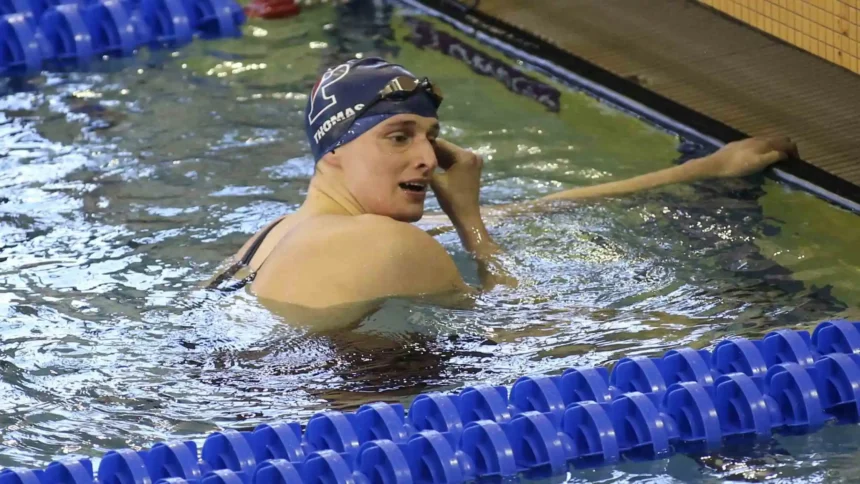Lia Thomas is an athlete of the swimmer category from America. She wrote history after being the first openly transgender athlete to win an NCAA Division I national championship.
This was in 2022 when she emerged the winner in the women’s 500 Yards freestyle swimming category. Thomas learned to swim in her childhood, then she swam for University of Pennsylvania’s Men swim team and then switched to the ladies team.
Significance of the Win
It was in March this year that Lia Thomas made history by becoming the first openly Transgender woman to secure a NCAA Division I national championship.
Lia Thomas won the women’s 500 yellow freestyle by doing the event in 4 minutes, 33 seconds. 24.
An important advancement for the transgender people in the field of sports erupted in Atlanta during NCAA Swimming and Diving Championships.
The case of Lia Thomas led to the debate regarding whether the women’s sport is supposed to be for all the female athletes regardless of their past sex.
Opponents of inclusion argue that they should be allowed but this has created concerns on equality and possibly unfair gains.
Reactions from the Swimming Community
The performance of Lia Thomas in the NCAA sports was unexpected and while celebrating her hard work and success, one cannot ignore the reception she got from other athletes and coaches: the debates about the participation of the trans athletes.
Some of Lia Thomas’s teammates and her supporters rejoiced at what was described as a positive step towards more transgender participation and labeled it as the urgency for everyone to be accepted and appreciated. Some criticized it because they felt it might not be fair for competition.
The Role of NCAA Policies
The NCAA’s rules about transgender athletes have changed to encourage being inclusive and also to make sure that competition is fair.
In January 2022, the NCAA decided to handle each sport differently, so their policies match those of the U.S. Olympic and Paralympic Committee.
Under this system, transgender women need to take testosterone-lowering drugs for at least one full year before they can compete in women’s sports.
On the opposite side, USA Swimming demands that female transgender athletes keep their testosterone levels low enough below a certain limit for a set amount of time to be able to participate in competitions for women.
Protests and Public Backlash
In 2022, the NCAA Swimming and Diving Championships had a big disagreement when they saw Lia Thomas, a person who transitioned from male to female, compete in women’s swimming.
Many people came outside the place where the competition was happening, calling themselves “Save Women’s Sports,” to speak up about keeping men and women athletes separate in sports.
These people disagreed, saying that letting transgender women play sports would hurt women’s sports.
They hold signs and give out leaflets, sharing worries about how it could affect female athletes’ fairness and integrity in competitions.
People protesting argued that things like bone shapes and how much air we can hold are important when talking about sports.
They stirred up a lot of debate about who we are as genders and if it’s fair in playing sports.
There was a big reaction, which ended with a group of 16 women athletes taking legal action against the NCAA.
Media Coverage and Public Perception
After Lia Thomas won the first NCAA game as a transgender athlete, news stories told different things, showing the divided views on her being in sports as a transgender person.
Big news places like The New York Times and USA Today talked about her win as a big step for transgender people in sports and what it means for everybody to be included.
Nevertheless, some sources, especially those with a conservative viewpoint, described her winning in ways suggesting unfair benefits were used.
They often questioned her identity using certain phrases. These different reports of the news made public opinion split. Social media also made both cheering on and criticizing her more intense and widespread.
Thomas’ Response to the Backlash
Even though there has been a lot of strong disagreement and problems about her joining, Lia Thomas has kept her mind on the swimming competition and wellbeing.
Lia Thomas talks about how much she loves the sport and wants to keep going in it, like thinking about trying out for the Olympic trials in 2024.
She has also talked about the mental health struggles she dealt with before changing, mentioning the deep sadness and thoughts of taking her own life.
Thomas has said that she does not think it is right to stop transgender athletes from competing or put them into different teams, believing that this would be “incredibly disturbing” and cause more unfair treatment.
Legislative Responses
In the year 2023, twenty-five states in the United States have made new rules or laws that stop transgender students from being on public school sports teams that match their gender identity.
Many of these rules, especially for transgender girls and women, come from conservative political thinking and shared prejudices against transgender folks.
In the states managed by Republicans, state lawmakers and the leaders of these states are leading these actions, describing it as a question of equality for women’s sports.
The ongoing talk about Lia Thomas and transgender athletes shows larger issues in society about who we are, fairness, and wanting everyone to be included in sports.
These conversations keep changing, they make us think differently about gender and ask for a new look at rules that decide how sports competitions are run.


Leave a Reply